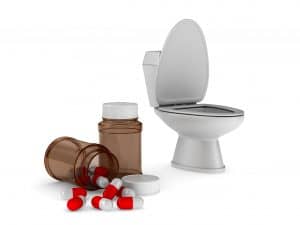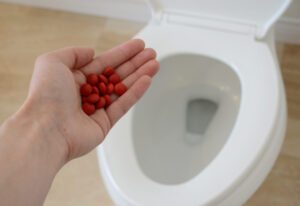Have you ever found yourself staring at a bottle of expired pills, wondering if flushing them down the toilet is the right move? You're not alone.
This question pops up frequently, leading to a variety of practices. In this article, we'll dive into whether it is illegal, bad, or safe to flush pills down the toilet, and what safety and legal considerations surround the disposal of expired pills. Stay tuned as we navigate through the murky waters of pill disposal.
Is It Illegal to Flush Pills Down the Toilet?
 In pondering over whether it is illegal to flush pills down the toilet, one might find the legal landscape somewhat varied.
In pondering over whether it is illegal to flush pills down the toilet, one might find the legal landscape somewhat varied.
In essence, the legality of this action hinges on local regulations and environmental laws that expressly forbid the introduction of pharmaceutical substances into the water system. Many jurisdictions have strict provisions against flushing medications, aiming to mitigate the adverse environmental impact associated with pharmaceutical contamination in water bodies.
While specific laws may differ from one place to another, the overarching theme remains consistent: flushing pills is often frowned upon and could be considered illegal, especially if local regulations directly address the disposal of pharmaceutical products. It's crucial to acquaint yourself with local waste disposal guidelines to ensure compliance and avoid potential legal repercussions.
The Environmental Impact of Flushing Pills
Many are unaware that flushing pills down the toilet can significantly harm our environment.
- This act introduces pharmaceuticals into the water cycle, substances which water treatment facilities are not always equipped to fully remove.
- Consequently, these medications can end up in rivers, lakes, and even the ocean, affecting aquatic life adversely.
Studies have shown that exposure to certain drugs can impact the growth, behavior, and reproductive functions of fish and other wildlife. Moreover, there's a lingering concern about these substances making their way back into the human water supply, potentially impacting public health. The environmental footprint left by flushed medications is both profound and far-reaching, challenging us to reconsider if it genuinely is bad to flush pills down the toilet and pushing us towards seeking alternative disposal methods that safeguard the planet.
Alternative Safe Disposal Methods
Given the concerns previously outlined, finding safe alternatives to flushing pills becomes imperative.
 Here are some recommended practices: Firstly, look for local drug take-back programs, often available at pharmacies or through community events, which ensure secure and proper disposal of unused medication. If such a program isn't accessible, the FDA recommends mixing the pills with unpalatable substances like dirt, cat litter, or used coffee grounds in a plastic bag; this mixture can then be thrown in the trash.
Here are some recommended practices: Firstly, look for local drug take-back programs, often available at pharmacies or through community events, which ensure secure and proper disposal of unused medication. If such a program isn't accessible, the FDA recommends mixing the pills with unpalatable substances like dirt, cat litter, or used coffee grounds in a plastic bag; this mixture can then be thrown in the trash.
This method makes the medication less appealing to children and pets and unrecognizable to individuals who may intentionally go through your trash. It's essential to scratch out all personal information on the prescription label to protect your privacy before disposal. These alternatives not only align with safe disposal practices but also comply with legal regulations, ensuring you aren't inadvertently causing harm.
Drug Take-Back Programs: A Safe Solution
Drug take-back programs represent a beacon of hope in the quest for environmentally friendly and legally compliant medication disposal.
These programs, facilitated by pharmacies, hospitals, and government agencies, offer a place where individuals can return unused or expired medications for proper disposal. Participating in these programs ensures that drugs are disposed of safely, preventing the risk of pollution to waterways and harm to aquatic life.
Furthermore, they minimize the risk of drug misuse by removing unwanted medications from homes. By leveraging these programs, you contribute to a collective effort to protect our environment and communities from the unintended consequences of improperly disposed medications. It's a simple, yet profoundly effective way to ensure that the disposal of your medications aligns with both safety and legal standards.
Understanding Medication Labels and Expiry Dates
 Properly disposing of medications starts with understanding what you're dealing with.
Properly disposing of medications starts with understanding what you're dealing with.
Medication labels and expiry dates hold crucial information that dictates how and when to dispose of these substances. An expiry date, for instance, signifies when a medication may begin to lose its effectiveness. Keeping medications past their expiry can pose health risks if consumed.
However, it's not just about efficacy; certain expired medications can become hazardous, making their disposal even more critical. Before deciding on disposal, examine your medication labels for any specific disposal instructions provided by the manufacturer. Some medications require special handling due to their potential environmental impact or abuse risk. Gaining a comprehensive understanding of these details can guide you in choosing the safest disposal method, ensuring you're not inadvertently contributing to pollution or endangering wildlife and humans.
The Real Consequences of Improper Disposal
The implications of improper medication disposal extend far beyond potential legal repercussions.
The environmental and health impacts can be profound. Pharmaceuticals that enter the water supply can disrupt ecosystems, harming wildlife that come into contact with contaminated water. In turn, this imbalance can have cascading effects on the food chain and biodiversity.
On a human level, traces of these substances in drinking water pose an unknown risk to public health, with potential to affect hormone function and resistance to antibiotics. Our actions have a ripple effect, underscoring the significance of adopting responsible medication disposal practices. The collective effort to dispose of medications responsibly can mitigate these risks, proving that individual choices can contribute to a larger environmental and public health solution.
